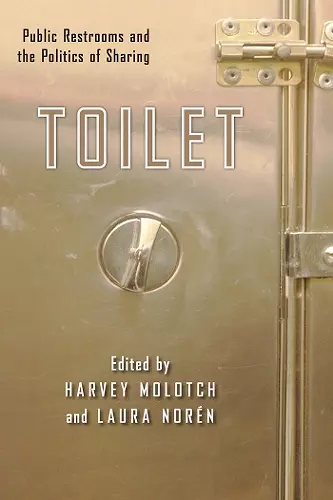Toilet
Public Restrooms and the Politics of Sharing
Harvey Molotch editor Laura Noren editor
Format:Paperback
Publisher:New York University Press
Published:17th Nov '10
Should be back in stock very soon

A sociological study of public restrooms
So much happens in the public toilet that we never talk about. Finding the right door, waiting in line, and using the facilities are often undertaken with trepidation. Don’t touch anything. Try not to smell. Avoid eye contact. And for men, don’t look down or let your eyes stray. Even washing one’s hands are tied to anxieties of disgust and humiliation. And yet other things also happen in these spaces: babies are changed, conversations are had, make-up is applied, and notes are scrawled for posterity.
Beyond these private issues, there are also real public concerns: problems of public access, ecological waste, and—in many parts of the world—sanitation crises. At public events, why are women constantly waiting in long lines but not men? Where do the homeless go when cities decide to close public sites? Should bathrooms become standardized to accommodate the disabled? Is it possible to create a unisex bathroom for transgendered people?
In Toilet, noted sociologist Harvey Molotch and Laura Norén bring together twelve essays by urbanists, historians and cultural analysts (among others) to shed light on the public restroom. These noted scholars offer an assessment of our historical and contemporary practices, showing us the intricate mechanisms through which even the physical design of restrooms—the configurations of stalls, the number of urinals, the placement of sinks, and the continuing segregation of women’s and men’s bathrooms—reflect and sustain our cultural attitudes towards gender, class, and disability. Based on a broad range of conceptual, political, and down-to-earth viewpoints, the original essays in this volume show how the bathroom—as a practical matter—reveals competing visions of pollution, danger and distinction.
Although what happens in the toilet usually stays in the toilet, this brilliant, revelatory, and often funny book aims to bring it all out into the open, proving that profound and meaningful history can be made even in the can.
Contributors: Ruth Barcan, Irus Braverman, Mary Ann Case, Olga Gershenson, Clara Greed, Zena Kamash,Terry Kogan, Harvey Molotch, Laura Norén, Barbara Penner, Brian Reynolds, and David Serlin.
"The politics of the loo, sexual as well as cultural, are taken up in a new book, Toilet: Public Restrooms and the Politics of Sharing, edited by Harvey Molotch and Laura Norén. It aims to tackle the language around toilets and open up debates that have gone on, so to speak, behind closed doors and that never get resolved" * Irish Times *
"The 12 essays in Toilet make clear that public toilets are anything but neutral, and argue that, in fact, restrooms-not just their design but where and to whom they are available-are loaded with cultural insights into views on race, sex, ability, and class...Toilet imparts a lesson: Pay attention. Those issues that most quietly fall into the background, unquestioned and seemingly benign, may be the most loaded and deserving of scrutiny." * Bitch Magazine *
"Peeing is political. The authors of Toilet show us how. In provocative essays from a range of perspectives, we learn what toilets (and their lack) teach us—about hierarchy, inequality, the body, aesthetics and politics. Using toilets as social and cultural prisms, they analyze global collective (in)action, outlining the deeply personal consequences for us all. This is wickedly smart, pointed and passionate public interest scholarship at its best.." -- Lisa Duggan,author of Twilight of Equality: Neoliberalism, Cultural Politics and the Attack on Democracy
"When Molotch and Norén let slip a few pissings or pees, the book becomes livelier, as is befitting of the subject. And the inclusion of essays from scholars of many different disciplines—gender studies, disability rights, architecture—makes this a toilet book not to be missed." * The New Yorker *
"Who could have imagined? A book that weaves cutting edge gender theory into urban planning policy by way of the lowly toilet? A wondrous compendium." -- Jane Mansbridge,Adams Professor in the Kennedy School of Government at Harvard University
"Ranging from studies of Roman latrines to quasi-ethnographic studies of contemporary restroom design projects, the authors rigorously and sometimes cleverly expose moral panics, gender ideologies, and contradictions of bathroom design, accessibility, and use." -- J.L. Croissant * Choice *
"We may not feel comfortable discussing them, but questions of where and how we do our business, particularly in public, have a tremendous impact on our everyday lives. Thats why Toilet: Public Restrooms and the Politics of Sharing, a new collection of academic essays, is so necessary." * Salon.com *
"In Toilet, academics from the field of sociology, law, urban planning, gender studies, archeology, and architecture ponder the meaning of a room some people can't even call by name." -- Kate Tuttle * The Boston Globe *
"This profound and surprising book takes up a subject usually kept private: the public restroom. These scholarly but mostly accessible new examinations of the topic provide fascinating insights on cultural notions of cleanliness and filth, public and private." -- Rachel Bridgewater * Library Journal *
"Toilet is full of such insightsthe prose is clear and readable." -- Kate Tuttle * Boston.com *
"Toilet opens the door to a profound and fascinating understanding of the way we use and are abused by public conveniences." -- Howard S. Becker,author of Outsiders: Studies In The Sociology Of Deviance
"An incredibly smart book about the importance of the toilet, especially for urban dwellers. I will never look at a toilet the same again." -- Mitchell Duneier,author of Sidewalk
"[T]his book offers precise insights—want to keep a public bathroom clean? Stick some flowers there. And it often cleverly illuminates whats in plain sight—say, the reasons why New York has so few female cabbies—but is usually ignored or assiduously avoided" * The Atlantic *
ISBN: 9780814795897
Dimensions: unknown
Weight: 454g
328 pages